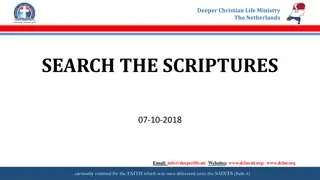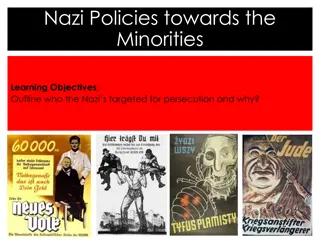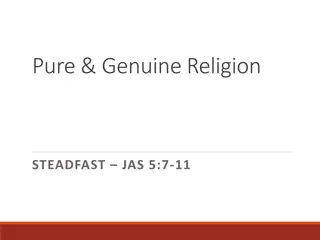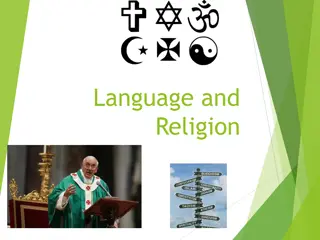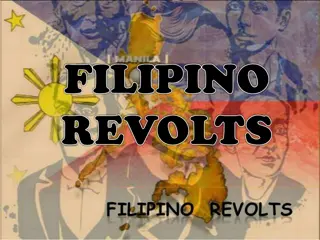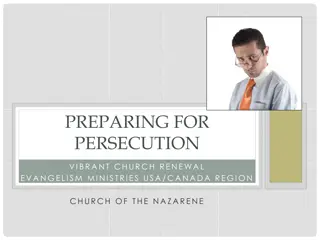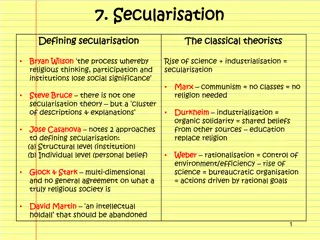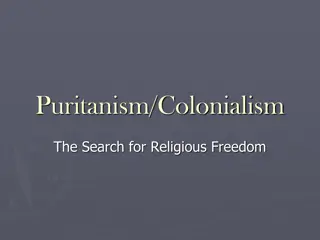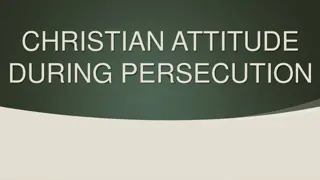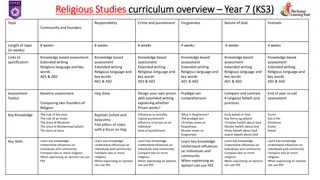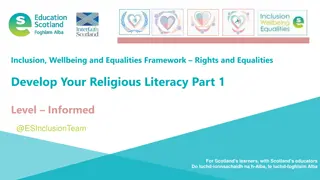Status of Family Laws in India: Hindu vs. Religious Minorities
The family and personal status laws in India vary between Hindu law and those pertaining to religious minorities. While Hindu law has seen extensive reforms, discriminatory provisions still exist. In contrast, laws governing religious minorities have undergone fewer reforms, leading to greater inequ
2 views • 4 slides
Understanding Religious Conflict: Definition and Types Explored
Religious conflict is a complex and recurring concept throughout history. Scholars have defined it as disagreements between religious groups. This conflict arises from contentious issues touching on ideology, morality, power, and identity, influenced by various socio-political, economic, and cultura
1 views • 13 slides
Evolution of Akbar's Religious Policy: A Historical Overview
In the 16th century, Akbar the Great implemented a revolutionary religious policy in the Mughal Empire. Initially a devout Sunni Muslim, Akbar evolved his stance to promote harmony and equality among all religions, fostering tolerance and understanding. This shift marked a significant departure from
1 views • 25 slides
Elizabethan Religious Settlement: Unity Amidst Division
Amid religious division in England, Queen Elizabeth I implemented a Religious Settlement in 1559 to unify the country. The settlement, a blend of Protestant and Catholic elements, aimed to maintain peace and prevent rebellions. Elizabeth's strategic compromise pleased most people, though lingering t
0 views • 14 slides
Understanding Secularism: Principles and Advantages
Secularism is the principle of separating government institutions from religious entities to ensure equal rights for believers and non-believers. It safeguards freedom of religious belief and practice, upholds religious freedom, and promotes democracy and fairness. Secularism aims to prevent religio
0 views • 21 slides
Enduring Persecution and Evangelism: The Believer's Posture Strongly Defined
Embracing the challenges of persecution and spreading the good news of the Gospel, this discourse explores the unwavering endurance and anti-anxiety posture required of believers in tumultuous times. Through biblical references and thoughtful reflection, it delves into the essence of overcoming adve
1 views • 14 slides
Understanding Religious Language: Cognitivism vs. Non-Cognitivism in the University Debate
This discussion explores the debate between cognitivism and non-cognitivism in religious language. Cognitivism asserts that religious claims aim to describe the world and can be true or false, while non-cognitivism argues that such claims express attitudes and cannot be verified. Flew's challenge qu
0 views • 9 slides
Christian Attitude During Persecution Study with Deeper Christian Life Ministry in the Netherlands
Explore the Christian attitude towards persecution with Deeper Christian Life Ministry in the Netherlands. Learn about the nature of persecution, how believers should respond, and the scope of persecution according to biblical teachings. Gain insights on enduring hardships for righteousness' sake an
3 views • 9 slides
Causes for the Downfall of the Mughal Empire
The decline of the Mughal Empire post-Aurangzeb's reign was due to factors such as religious persecution, the Deccan policies, weak successors, financial difficulties, neglect of sea power, European settlement, and invasions. These political, social, and economic issues contributed to the downfall o
0 views • 9 slides
Nazi Persecution of Minorities: Targets and Rationale
The Nazis targeted various groups for persecution, believing in a racial hierarchy where certain races were deemed inferior. They aimed to eliminate those they considered undesirable, including Gypsies, black people, the mentally disabled, homosexuals, and more. The Nazis' actions were driven by the
7 views • 12 slides
Guide to Using the BSA Calendar of Religious Observances
The BSA Calendar of Religious Observances is a valuable resource for scheduling scouting events in consideration of various religious holidays and observances. This guide provides an overview of the calendar, highlights important dates, and emphasizes the importance of respecting religious diversity
0 views • 8 slides
Understanding Pure and Genuine Religion in the Face of Persecution
Explore the concept of pure and genuine religion in the midst of trials and persecution as outlined in the Book of James. Delve into the importance of steadfastness, patience, and anchoring oneself in faith while facing challenges and opposition, drawing inspiration from biblical teachings on enduri
0 views • 12 slides
Historical Overview of 1st Maccabees: Key Events and Characters
The content provides a historical background on the book of 1st Maccabees, focusing on key dates such as the return from Babylonian captivity, construction of the Temple, and the reign of Alexander the Great. It introduces important figures like Mattathias and his sons, highlighting their role in re
2 views • 34 slides
Overview of Expedited Removal, Asylum, and Credible Fear Interviews
Expedited Removal is a process where individuals arriving at U.S. ports of entry may be subject to deportation if found inadmissible under specific grounds. This includes misrepresentations or lack of valid entry documents. The process can be applied by the Department of Homeland Security within 100
1 views • 14 slides
Understanding the Role of Language in Religion
Exploring the significance of language in religious contexts, this content discusses the functions, features, lexicon, grammar, and metaphorical aspects present in religious language. It delves into how religious language upholds spiritual beliefs, persuades believers, and expresses specific attitud
0 views • 8 slides
Understanding the Cultural Dimensions of Food and Religious Influences in Culinary Arts
Explore the impact of religious beliefs on food traditions and dietary restrictions across different cultures in the culinary world. Learn about the influence of major world religions on eating habits, food choices, and culinary practices. Discover how various religious groups, such as Christians, o
0 views • 26 slides
Filipino Revolts Against Spanish Colonial Rule in the Philippines
The Filipino revolts against Spanish colonial rule in the Philippines were driven by various causes such as the desire to regain lost freedom, Spanish oppression, hated tribute, forced labor, religious persecution, agrarian disputes, and more. These revolts occurred at different times in various reg
0 views • 15 slides
The Vital Role of Religious Institutions in Supporting Immigrants
Religions and immigration are interlinked in modern societies, where religions play a significant role in providing services, defending rights, and supporting the social cohesion of immigrants. Mainstream religious institutions serve as key actors in offering assistance, advocating for migrant right
2 views • 14 slides
Understanding Religious Language: Flew, Hare, Mitchell
Exploring the contrasting views of cognitivism and non-cognitivism in the context of religious language through the perspectives of Flew, Hare, and Mitchell. Delve into Flew's challenge on the undetectable gardener, Hare's concept of bliks, and Mitchell's response to the rationality of religious bel
0 views • 7 slides
Preparing for Persecution: Empowering Christ-Followers to Face Challenges
Prepare for persecution with the "Preparing for Persecution" module, designed to equip Christ-followers to face harassment and punishment for their beliefs. Learn to rejoice despite social disapproval and understand the difference between opposition and persecution. Explore why Christians suffer per
0 views • 24 slides
Religious Accommodation in the Army: Advising Command
The content discusses the role of the Chaplain Corps in advising Soldiers and leaders on religious accommodation in the Army as of February 13, 2019. It covers learning objectives, legal foundations, Army policies, procedures, recent changes, and references related to religious accommodation. The in
0 views • 36 slides
Understanding Religious Discrimination Laws in California Workplace
Learn about the regulations and protections under FEHA and Title VII in California, including religious exemptions, accommodation requirements, case studies, and best practices to address discrimination issues effectively. Discover the statistical insights on religious discrimination complaints and
0 views • 45 slides
Understanding Secularisation: The Decline of Religious Influence in Society
Secularisation refers to the process in which religious thinking, participation, and institutions lose their social significance. This phenomenon is influenced by factors such as the rise of science, industrialisation, changing social attitudes, and the disengagement of the church from society. Evid
0 views • 8 slides
Philosophers' Views on Religious Experience: Insights and Critiques
This lesson delves into the perspectives of various philosophers such as Rudolph Otto, Richard Swinburne, John Hick, and Michael Persinger on religious experiences. It explores concepts like the numinous, religious knowledge, God's existence, and criticisms on the validity of religious experiences.
0 views • 7 slides
Philosophers' Views on Religious Experience: Insights from William James
Explore William James' perspective on religious experiences, including his views on existential and value judgments. Understand how James argued for the validity of religious experiences and their potential proof of God's existence. Delve into the implications of emotions and prior beliefs on interp
0 views • 7 slides
The Dark Period of the Spanish Inquisition
The Spanish Inquisition, led by figures like Tomas Torquemada, targeted Muslims, Jews, and non-Christians in a ruthless pursuit of confessions using torture methods like the rack, water torture, and the brank. Ferdinand and Isabella of Spain oversaw this era of religious persecution that lasted from
0 views • 22 slides
Religious and Social Conflicts Fueling the Rise of Absolutism in Europe
Social, economic, and religious conflicts in Europe played a significant role in the emergence of absolutism where monarchs wielded supreme power without sharing it with legislative bodies. Events like Spain's religious conflicts, Protestantism in England, the Spanish Armada, religious conflict in t
0 views • 10 slides
Religious Pluralism and Civil Society: A Paradox in Government Control
Understanding the intricacies of religious pluralism in the context of government control reveals a paradox where restricting religion can hinder social cohesion and economic growth. Through insights on the counterproductivity of control, the role of religious organizations in civil society, and the
0 views • 16 slides
Understanding Puritanism: Beliefs, Values, and Persecution in the 16th-17th Centuries
Puritanism was a movement that sought to purify the Church of England, advocating for simpler worship practices and personal spiritual connection. The Puritans faced persecution in England, leading many to flee to new lands like Holland and eventually North America. Their beliefs emphasized salvatio
0 views • 14 slides
Grounds for Granting International Protection to FGM Survivors
The revised EU Asylum Qualifications Directive clarifies grounds for granting international protection to FGM survivors and those at risk. Women and girls facing persecution or the threat of FGM are eligible for protection. Gender-based persecution, particularly on the basis of FGM, must be consider
0 views • 12 slides
The Puritan Search for Religious Freedom in Colonial Times
Puritans and Pilgrims sought religious freedom in the New World to escape persecution in Europe. Embracing Calvinism, they emphasized the literal interpretation of the Bible and the doctrine of total depravity. This period marked a quest for social order and spiritual certainty, shaping early Americ
0 views • 13 slides
US Religious Freedom Restoration Act (RFRA) Overview
The US Religious Freedom Restoration Act (RFRA) aims to protect the free exercise of religion by ensuring that governments do not substantially burden religious practices without compelling justification. It emphasizes striking a balance between religious liberty and governmental interests through t
0 views • 9 slides
Christian Attitude During Persecution: Enduring for Christ's Sake
Persecution is a challenge faced by Christians due to their love for Jesus. This study delves into reasons for persecution, biblical examples, and the Christian attitude needed to endure such trials, as outlined in 1 Peter 4:12-19. It emphasizes the distinction between suffering for Christ and suffe
0 views • 17 slides
Persecution and Transformation: Stories of Faith and Resilience
Explore a collection of images and narratives showcasing the themes of persecution, adversity, and transformation from Acts of the Apostles, the Civil War era, and modern teachings. Delve into the journeys of Phillip, Saul, and early saints as they navigate challenges and emerge strengthened by fait
0 views • 9 slides
Religious Studies Curriculum Overview for Year 7 and 8 (KS3)
Explore various topics such as responsibility, crime and punishment, forgiveness, nature of God, festivals, community, founders, worship, creation, life after death, rules and laws, relationships in this detailed Year 7 and 8 (KS3) Religious Studies curriculum. The curriculum includes assessments, e
0 views • 6 slides
Immigration and Slavery in the American Colonies (1607-1765)
The American colonies experienced significant immigration, with English, Irish, and German settlers seeking a new beginning. Many English immigrants were indentured servants, while Irish and German immigrants faced push factors like war and religious persecution. Additionally, the slave trade played
0 views • 42 slides
Holocaust Memorial Day 2022: Remembering Genocides Across History
Holocaust Memorial Day, observed on 27th January, serves as a day of remembrance for the Holocaust, Nazi Persecution, and genocides in Cambodia, Rwanda, Bosnia, and Darfur. It aims to educate and honor the victims, highlighting the horrors of terrorism, persecution, and genocide inflicted on various
0 views • 22 slides
The Impact of Volksgemeinschaft in Nazi Germany
The concept of Volksgemeinschaft in Nazi Germany aimed to create a racial community of pure Germans while excluding outsiders, especially Jews. It emphasized the Aryan master race, traditional gender roles, and discriminatory policies against minorities. Despite attempts to promote unity and loyalty
0 views • 8 slides
Developing Religious Literacy for Educators in Scotland
This resource aims to enhance educators' understanding of religious literacy by exploring religious discrimination, core beliefs of major faiths, and additional learning sources. It encourages educators to consider the needs of learners in relation to their religious beliefs in Scotland.
0 views • 30 slides
Settling the Northern Colonies: Religious Transformation and Colonization
The Protestant Reformation led to the emergence of Puritanism in the Northern Colonies, with figures like Martin Luther and John Calvin shaping religious beliefs. The Massachusetts Bay Colony stood as a beacon of self-government and religious ideals, while dissenters like Anne Hutchinson and Roger W
0 views • 9 slides







